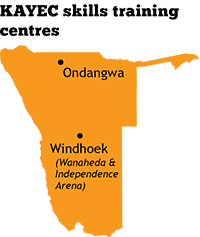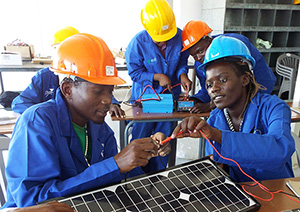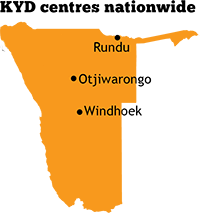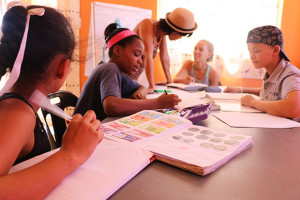About Katutura Youth Enterprise Center (KAYEC)
KAYEC is a Namibian non-profit (registered trust T 250/99), opened by Founding Father Sam Nujoma in 1995, that incubates new education solutions in partnership with Government and private partners. Originally known as the Katutura Youth Enterprise Centre, we now work nationwide.
Skills training: How we work
 KAYEC began skills training services at our Wanaheda (Windhoek) centre in 1995, just after independence, to help combat the nation’s critical levels of youth unemployment. In 2002 we opened our second centre in Ondangwa (see map). Today we graduate up to 750 trainees each year.
KAYEC began skills training services at our Wanaheda (Windhoek) centre in 1995, just after independence, to help combat the nation’s critical levels of youth unemployment. In 2002 we opened our second centre in Ondangwa (see map). Today we graduate up to 750 trainees each year.
In Namibia, nearly half of 15- to 34-year-olds are in need of work, short on key skills that our market demands. Trade schools are a central part of the solution: The National Development Plan 4 calls for vocational education “targeting the entire country,” and Namibia has opened a nationwide network of Vocational Training Centres for students who have finished Grade 10.

KAYEC complements the public vocational system by serving those trainees who still slip through the cracks: Most Namibians do not qualify for a state-run centre, because most drop out of school before completing Grade 10. To help these young people get back on the economic ladder, KAYEC offers a different kind of training: no entry requirements and no high fees, thanks to the sponsors who subsidise our courses. Quality remains high: Our six-month courses are accredited by the Namibia Training Authority (Level 1) and Namibia Qualifications Authority, with additional maths, English and life skills components that our trainees require.
School support: How we work
 The KAYEC Youth Development (KYD) programme started in 2004, doing sports outreach with 60 children in Wanaheda. Thanks to major seed funding from the U.S. President’s Emergency Program for AIDS Relief (PEPFAR), through the U.S. Agency for International Development (USAID), we grew to nine towns nationwide by 2010, the year KYD took its current name. Today, we work with some 375 kids each year in location areas of three towns and cities (see map), where partner schools refer learners who can benefit most from our structured, long-term personal and educational support.
The KAYEC Youth Development (KYD) programme started in 2004, doing sports outreach with 60 children in Wanaheda. Thanks to major seed funding from the U.S. President’s Emergency Program for AIDS Relief (PEPFAR), through the U.S. Agency for International Development (USAID), we grew to nine towns nationwide by 2010, the year KYD took its current name. Today, we work with some 375 kids each year in location areas of three towns and cities (see map), where partner schools refer learners who can benefit most from our structured, long-term personal and educational support.

Our programme team (Co-ordinator, five full-time Youth Officers, plus local and international volunteers) offer a structured weekly curriculum, focusing on balanced development for each level from Grade 4 to 12: English, maths and science, life skills and leadership, arts and sports, community service and career guidance. We have found that when kids can depend on just eight extra hours each week throughout early high school, with trained and dedicated adults paying attention to their studies and family circumstances such as poverty, neglect, abuse and the effects of HIV, it can mean the difference between success and failure in the classroom and in life.